Podcast
Questions and Answers
What are the objectives of the course 'Energy Sources and Powertrain Electrification'?
What are the objectives of the course 'Energy Sources and Powertrain Electrification'?
Understand automotive powertrain layouts, evaluate powertrain architectures, analyze energy sources and storage, and assess tank-to-wheel efficiency.
Which week focuses on 'CNG & LNG - properties & infrastructure'?
Which week focuses on 'CNG & LNG - properties & infrastructure'?
- Week 4
- Week 2
- Week 1
- Week 3 (correct)
Who is the co-founder and president of evACAD?
Who is the co-founder and president of evACAD?
- Bhushan Bissa
- Dr. Makarand Lokhande
- Vikrant Vaidya (correct)
- None of the above
Renewable electricity sources are discussed in Week 4.
Renewable electricity sources are discussed in Week 4.
What is the focus of Week 2 in the course structure?
What is the focus of Week 2 in the course structure?
The primary educational qualification of Dr. Makarand Lokhande is a PhD in ______.
The primary educational qualification of Dr. Makarand Lokhande is a PhD in ______.
Match the following course faculties with their educational qualifications:
Match the following course faculties with their educational qualifications:
Flashcards are hidden until you start studying
Study Notes
Course Overview
- Course focuses on Energy Sources and Powertrain Electrification in the automotive industry.
- Objectives include understanding powertrain layouts, analyzing architectures, and assessing energy sources.
Course Structure
-
Week 1:
- Basics of Internal Combustion Engine (ICE) powertrains and their evolution.
- Basic calculations involving ICE.
-
Week 2:
- Comparison of ICE with electric drive systems.
- Introduction to on-board energy storage devices and hydrogen (PEM) fuel cells.
-
Week 3:
- Properties and infrastructure for Compressed Natural Gas (CNG) and Liquefied Natural Gas (LNG).
- Overview of biofuels and their infrastructure.
-
Week 4:
- Sources of electricity in fixed generation focusing on renewables.
- Solar PV efficiency for vehicle on-board systems and transmission/distribution considerations.
Key Analytical Components
- Assessment of tank-to-wheel efficiency across various powertrain architectures and energy storage options.
- Energy consumption calculations for battery electric vehicles (BEVs) and hybrid electric vehicles (xEVs).
- Lifecycle energy analysis and tailpipe emission estimation tools.
Faculty Background
-
Vikrant Vaidya:
- Co-founder of evACAD with over 22 years of experience including roles in Tata Consultancy Services.
-
Bhushan Bissa:
- Trainer at evACAD with a focus on automotive engineering and 13+ years of industry experience.
-
Dr. Makarand Lokhande:
- Associate Professor specializing in power systems with 14+ years of academic experience and a PhD from IIT Bombay.
Essential Topics and Tools
- Hydrogen Fuel Cells: Basic sizing calculations and infrastructure analysis.
- Grid Emission Factors: Estimation tools to assist in understanding emissions associated with electricity generation.
- Comparative Fuel Analysis: Examines the efficiencies and properties of various fuels used in transportation.
References
- Selected academic texts on electric, hybrid, and fuel cell vehicles, providing a foundation for course content and research discussions.
Studying That Suits You
Use AI to generate personalized quizzes and flashcards to suit your learning preferences.




